#antinous the lover
Text

Well, but it’s my Antinous under the ocean! Nice surprise from the muses...
Ivan Bilibin The Little mermaid • 1920
#antinous#antinous the navigator#antinous the liberator#antinous the lover#religio antinoi#mermaid#the little mermaid#sirens#mermaids#legends#hans christian andersen#16 avril 2024#reblog#lgbtqia+history#lgbt
12 notes
·
View notes
Text

"Adoration"
#edit#aesthetic#artist#collage#collage art#artists on tumblr#pop art#art#contemporary art#artwork#digital art#statue#antinous#couple#love#lovers#kiss#movie#film
49 notes
·
View notes
Text

"Imagining Antinous"
#antinous#hadrian and antinous#male lovers#ai men#ai generated#ai artwork#ai art community#gay ai art#reimagined history#tragic story#symbolist art#art direction#fashion illustration#male form#male figure#male art#homoerotic#cult of antinous
18 notes
·
View notes
Text


Thy death has given me a newer lust— A flesh-lust raging for eternity
- Antinous by Fernando Pessoa
#antinous#hadrian#fernando pessoa#dark academia#academia#classic academia#which could mean nothing#(except they were known lovers)#chicago institute of art!!!!
4 notes
·
View notes
Note
Well if the good omens bartylus brainrot can't be stopped then it must be encouraged
Can you share any interaction or dialogue you can't stop thinking about?
(also, good whatever-time-it-is-in-your-timezone!)
Helloooo Ary, my dear
I hope you know what floodgates you just opened. I'm going to try to make this sound even a little bit concise and not just like a lengthy ramble, but no promises
It's going to be a mix of me gushing over Good Omens and how perfectly bartylus translates to it, so strap in ♡
First of all, Crowley. Barty. Need I say more?
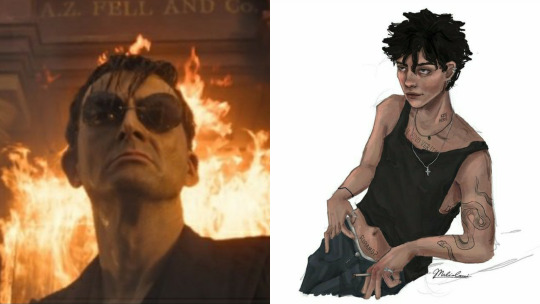
Fanart credit: twosidedstarr on Instagram and Pinterest
Look at them! They're two of the same, swagalicious, out of pocket, impulsive idiots, and, I'm sorry, but Barty as the snake in the Garden of Eden?
In God's universe, Bartemius, now affectionately referred to as Barty, along with the rest of his human name, Crouch Jr. (not to be confused with Crouch Sr., who was also him, just a couple hundred years ago to be realistic), has been dealt a losing, rather shit hand. Course he is a demon, that's sort with the territory, but he was an angel once too. Doesn't really get what all the fuss was about, it was awful up there, all the white and the glass, gave him a headache.
He was never cut out for Heaven, and Hell is just depressing, and in either he's a miserable excuse for a being, either occult or ethereal, and that is why Barty, formerly Bartemius, Crouch Jr., formerly Sr., is so in love with Earth.
And then there's Aziraphale and Regulus, which is, I think, more of a reach but definitely still completely valid
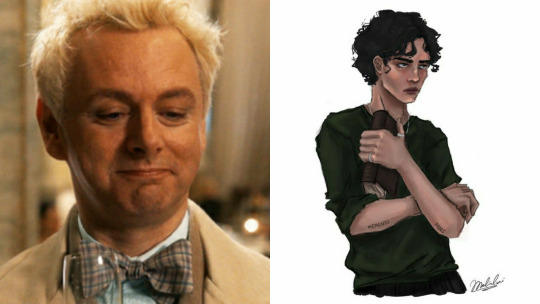
Fanart credit: twosidedstarr on Instagram and Pinterest
It's important to note that Azzie here is softboi core to the bone, and Regulus is absolutely not. While I think they have a lot of the same fundamentals ideologies, like fierce loyalty, they are very different. Aziraphale wants to believe in the good will of angels only to, slowly, over time, realise how corrupt it is, and I think this parallels amazingly with Regulus's experience with Death Eaters and the Dark Side - BUT Regulus is NOT a softboi, I will not reduce him to this
Consider this analogy for further explanation
Aziraphale and Crowley:

Barty and Regulus:

Regulus can't just abandon Armageddon all together. Not because he particularly fancies being at war, but because of the opposite. He's not the coward Barty seems to think he is - he's not the one trying to run away from this. He's the one trying to fucking stop it from happening entirely, if not for his own sake then for all those innocent humans that aren't ready to be judged yet. That never asked for any of this. That are caught in the crossfire just so good and evil, whatever the fuck those even mean anymore, can figure out who's best.
Regulus has to try. If Sirius taught him anything it's that hope is worth the plunge, no matter what's waiting on the other side.
NOW why am I currently obsessed with this, may you ask? Does it have to do with David Tennant's David Tennant-ness? Yes, a lot actually. Because through him and his portrayal of Crowley, I was able to understand a version of Barty that I could see in Crowley, because I actually relate to him. Probably more than one should relate to a demon but that's the whole point of the show!
The glory and freedom, allure of humanity
It's the story of a demon and an angel that have fallen in love with humanity (and each other) and are willing to give everything up to stay together. Because, if they lose humanity, they lose the bridge over which they can be together, and when the end of the world threatens it's destruction what do they do?
Stop the end of the world, obviously
They go against everything they've been taught, everything they've been told is right and wrong and devine and instead of doing what they should they do what they want to do, which I just think is so beautiful. And opens up a lot for Regulus's character. I mean, Barty's a fallen angel soaked in corruption, he's not blind to it and escapes it in humanity, fueled by spite, whereas Regulus wants to believe he's doing the right thing, that's he's on the right side, and has only really a matter of days to understand that he's not - that there is no right side, only a wrong one. And, instead of fighting for the greater good, do you know what he fights for?
Barty. A demon. A demon that was never evil and never cruel to him, a good person deep deep down
It just suits them SO WELL in my mind
But that's not enough for Barty, of course it's not. To him, he's still just a stubborn coward that still believes in God's Plan. To Barty, he's given up on them, and he can't tell him that he'd never do that, not in another six thousand years, not in eternity if they ever even make it there.
I've written out their version of the bandstand breakup, and I WANT more than ANYTHING to write Barty saying the words "you're so clever, how can somebody as clever as you be so stupid" right to Regulus's face (for those of you that haven't seen the show, don't worry, he absolutely deserves it in the moment). I want to write Barty's collapse, his last few hours on Earth, saying goodbye to the life he loves and his best friend, his partner, his Angel, who he'll never get to be with again. His desperation to find an out, to keep his little Regulus shaped slice of heaven that he knows he doesn't deserve
I want to see Barty when he believes Regulus has gone back to heaven, just hours before the end of the world, and that he never even got to say goodbye
Skip to 2:20
youtube
Also, come on, Barty driving through hellfire while blasting queen just to make sure he gets to the end of the world in time to stop it from, well... ending
youtube
Then of course there's the holy water scene, Regulus breaking the rules to get Barty a thermos of it so he doesn't end up risking own life to get it in less legal ways. Giving him LITERALLY the means of his own destruction, because Regulus is the only one how can
Because, you see, the trouble with loving someone is that, in doing so, you give them a step my step guide on how to destroy you. Not with holy water or hell fire, but deep deep within. You don't even realize it, Barty certainly didn't, at least not until right now.
I also really want to explore their dynamic! Barty shares Crowley's impulsivity and energy, and he's a bit of a gambler in my mind, getting more of a thrill out of just winning for once than the actual game
"It's not like you need human money," Regulus reminds him.
"Nah," he just shrugs, shoving his hands into his British pound lined pockets. "I just enjoy the game, really. It's fun, you should try it sometime."
"Definitely not."
"And the atmosphere. Can't get that kind of an atmosphere anywhere else."
"Think a nightclub might be similar? Perhaps a pub?"
"Eh. Too much lust, not enough greed, and I get enough of that downstairs," Barty corrects and gets out his keys. "Dinner?"
Regulus, on the other hand, is more reserved and to the point. I did come up with this particular distinction between them that, if someone were talking to them and they didn't really want to talk, Regulus would stay and listen though making it clear he wasn't interested, and Barty would just say "yeah, sorry, don't really care" and be on his merry way. I also think Regulus is a bit of a foodie, in that he loves the different types of human meals and flavors and how each reflect a different culture and background. It's just the little things for Regulus, food and books. Books that allow him to travel to different worlds in which God doesn't exist and he can be anything he wants to be, not just an angel bound to the Greater Good
Also Barty is an ABSOLUTE simp
Regulus, much the same and far less likely to admit it, is in love with the fascinating world of humans too. Most particularly the food. Technically they don't need to eat, it's not a requirement, Barty only ever does it when he feels it's neccessary for appearances or when Regulus insists that he just can't go on living without at least trying a bite. Regulus, however, is a connoisseur. When he acquired his townhome in central London back in 1979, his main concern was the size and capabilities of the kitchen. For comparison, Barty doesn't think he's ever once touched the kitchen in his flat, aside from the one time Regulus asked him to store a cake in his refrigerator. He's thinking of having it refinished into another plant room.
His all time favorite is French food, after a particular excursion during the French Revolution filled with temptation, miracles, crepes, and a near mountain of baguettes. He learned quiche, creampuffs, and croque in Paris, fell in love with garlic in Italy. Spain got him hooked on chocolate and olives, and the shrimp came about from one confusing trip to Japan that Barty isn't fully certain actually happened. He also likes waffles, but that's far too American for him to admit.
So Barty takes them to Le Gavroche, which he is aware is secretly Regulus's favorite, not because the food is good, but because the restaurant itself is so flashy and sought after it takes an angelic miracle to secure them a table. He, as a higher, or technically lower being, is not limited by human languages, well versed and able to communicate in any one he chooses, but there is an unspoken agreement in which he allows Regulus to translate the menu into English for him and does not remind him that he, too, knows French.
So, in conclusion, it's not really a concrete thing it's just the entirety of them. The story of Good Omens is so good and through the lense of Barty and Regulus, who are both very different and very similar to Crowley and Aziraphale, would be just *chefs kiss*. They're two idiots choosing each other over a war and how can you not fall on your knees as to how tooth achingly sweet it is?? "Aww, Reg. You were willing to kill the antichrist for me? Little ol' me?" "Shut up."
Ary, this was very long and hardly made any sense, so I apologize, but I had the time of my life writing all of this down for you. Did I actually answer your question? I have no idea! But I definitely did something, so... tada!!
Brainrot successfully encouraged, this going to be all I can think about for the rest of the day...

#also i wanted to explore some of their sexuality too#i mean obviously they're an angel and a demon#they're agender and asexual however male presenting and completely in love with each other#less of determining labels i think barty would be attracted to it just because of the humanness of it#he loves all things human#but i don't think he's just sleeping around#i think that's something he reserves only for regulus#and i think it started after a run in with hadrian and antinous in londinium in 128#historical mxm lovers from the time of ancient romans#and this got barty thinking naturally#it's weird because i don't want it to appear how sex usually appears#because it's much different for them#it's connecting with each other and humanity in a way they can't in any other fashion#so it's not about the details or how it's done or the end result as humans are so typically infatuated#it's just the act of doing it and knowing that's what they're doing#something so so human#that makes all the difference#anyway this was a lot#and there is a ladybug in my blinds i have to take care of#so apologies once again for all of this#but ary asked for it!#it's not my fault!!#i do hope you enjoyed this trainwreck of an explaination though ary ♡#thank you for the ask!#ary tag#♡♡♡#the brainrot prevails#bartylus#and their good omens counterparts#essay done ted talk over
7 notes
·
View notes
Text

Marble bust of Antinous as Osiris, circa 130s CE, from Hadrian’s Villa at Tivoli
0 notes
Text

Antinoös, by paflagonian
Bust of Antinoös, the young Greek lover of the Roman emperor Hadrian. The original sculpture is exhibited in the National Archaeological Museum of Athens.
#antinoös#greek statues#greek sculpture#greek gods#hadrian#lgbtq#athens archaeological museum#antinoös bust#portrait#antinous#roman emperors lover#pop art#athens#greece#paflagonian
1 note
·
View note
Text
More on Epic!Ares cause "The Lovers" section of God Games will not get out of my head. The thing I don't think fans are recognizing is that Ares's last line "pathetic and weak like his son" is very deliberately meant to provoke Athena, it's meant to test why she's doing this.
Consider how Telemachus went into the fight with Antinous, he didn't have a plan, only a goal, and he stood his ground, no cunning techniques only fists. Which is something Ares would agree with doing, not only that but remember what Antinous and the suitors want to do to Penelope, why Telemachus was fighting in the first place. Ares is a god known to be a defender of women, one of his biggest myths is about him killing a son of Poseidon because he assaulted his daughter. Considering that he likely wouldn't call Telemachus weak unless it was to get to Athena.
Which it did and that show of love and protectiveness over Telemachus is what convinced both Ares and Aphrodite to let Odysseus go. They are not ruled by logic and objectivity, which is what prepared her for Hera and Zeus, with Hera, Odysseus never cheating isn't a logical argument but it's what would work on Hera. With Zeus it was more important, Athena showing emotion and showing that vulnerability gave her the ability to sacrifice her pride. At the end of the song she begs Zeus to let Odysseus go, not longer being the "selfish, prideful and vain" Goddess that she was when her and Odysseus parted ways.
#epic ares#epic athena#epic the musical#epic the musical wisdom saga#epic the wisdom saga#athena#ares
929 notes
·
View notes
Text
i think that Grantaire being canonically attracted to men can hardly be disputed because he's very explicit in his attraction and love for Enjolras, to the point where i hardly ever see anyone deny this (even outside of the fandom i mean), but i do think that it's actually very very clear we're meant to interpret Enjolras as homosexual?
of course it has always been interesting to me how Victor Hugo chose to introduce Enjolras as a wild Antinous (emperor Hadrian's gay lover), only to tell us a few lines later tells us he wasn't aware that there was a being on earth called woman and like, yeah i guess that's pretty gay but there's still some space for debate. how on earth are we supposed to interpret the following sentence though
"Evadne's bare bosom would have moved him no more than Aristogeiton; to him, as to Harmodius, flowers were good only for hiding the sword"
so in his first introduction, like in the same fucking PARAGRAPH he's compared to not one, not two but THREE different gay men, and one of those comparisons is there to explicitly say that he wouldn't care if a woman showed her tits to him. it's an INSISTENT analogy that only gets stronger when we get to grantaire's part, with them being pretty much two sides of the same coin, getting compared to even MORE gay men
#les mis#les miserables#the brick#enjolras#like all i'm hearing is: he's gay and pure#i do think that vicky was explicitly saying he's a gay man#the heart of the revolution is gay#and the climax of their revolution (e and r's death) is gay#it's so funny to me how repetitive i can get like it's the same 10 pages that get analyzed all the freaking time but i can't help myself#i think aroace enj is still very valid btw
337 notes
·
View notes
Text
The Epic fandom is testing me today I WILL write/draw Telemachus x Antinous smut soley for spite do not try me
Yall wanted Enemies to lovers and then get upset when they're not just slightly mean to each other and the designated top doesn't just push the designated whinebag 'pure little uwu baby' twink into walls.
#wolffox speaks#Stop infiltizing Telemachus he's immature but he's fucking 20#in the Odyssey Antinous is like 18-19#and even if he was older Telemachus did NOT grow up around the suitors. They were only there for 3 years#epic the musical#Telemachus x Antinous#Antinous x Telemachus#Epic the musical
113 notes
·
View notes
Text
"Kemetic How-to Guide: Who Was Antinous?"
youtube
He was prayed for dead children too ?! Hazel-nuts as offerings, why not? Interesting!
#antinous worship#modern antinous#antinous the lover#antinous the liberator#antinous#cult of antinous#the bithynian boy#Youtube#studyblr#study#history#ancient rome#ancient egypt#ancient greece#deification#demi god#antinous daimon#daimon#agathos daimon#greek polytheism#hellenic polytheism#polytheism#greek paganism#paganism#pagan#neopaganism#neopagan#lgbtqia#gay#queer
20 notes
·
View notes
Text
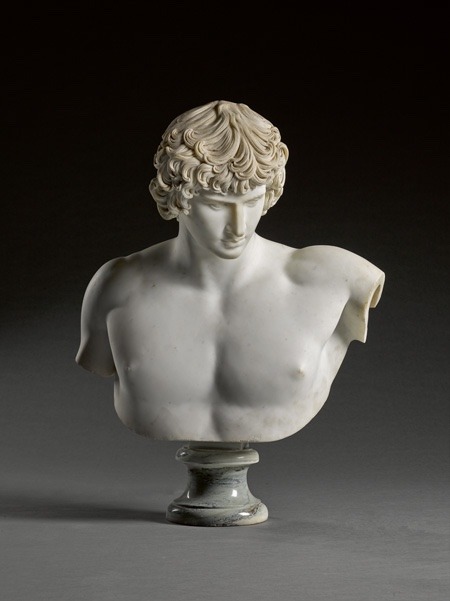

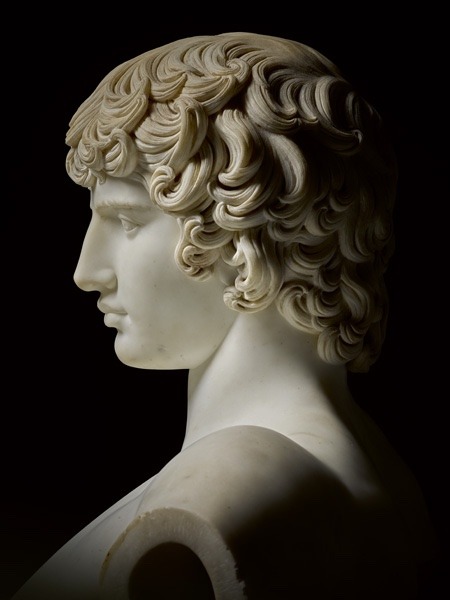

Antinous was a Greek youth from Bithynia and a favourite and lover of the Roman emperor Hadrian. After his death, Hadrian had Antinous deified and an enduring cult of worship solidified around him.
165 notes
·
View notes
Text

Homosexuality in History: Kings and Their Lovers
Hadrian and Antinous
Hadrian and Antinous are famous historical figures who epitomize one of the most well-known homosexual relationships in history. Hadrian, the Roman Emperor from 117 to 138 AD, developed a close friendship with Antinous, a young man from Egypt. This relationship was characterized by deep affection and is often viewed as romantic. There are indications of an erotic component, evident in Hadrian's inconsolable reaction to Antinous's tragic death. Hadrian erected monuments and temples in honor of Antinous, underscoring their special bond.
Alexander the Great and Hephaestion
The ancient world was a time when homosexuality was not as taboo in many cultures as it is today. Alexander the Great and Hephaestion are a prominent example of this. Alexander, the Macedonian king from 336 to 323 BC, and Hephaestion were best friends and closest confidants. Their relationship was so close that rumors of a romantic or even erotic connection circulated. After Hephaestion's death, Alexander held a public funeral, indicating their deep emotional bond.
Edward II and Piers Gaveston
During the Middle Ages, homosexuality was not as accepted in many cultures as it is today. The relationship between Edward II and Piers Gaveston was marked by rumors and hostilities, demonstrating that homosexuality was not always accepted in the past. Their relationship is believed to have been of a romantic nature, leading to political turmoil and controversies. Gaveston was even appointed Earl of Cornwall by Edward, highlighting their special connection.
Matthias Corvinus and Bálint Balassi
In the Renaissance, there was a revival of Greco-Roman culture, leading to increased tolerance of homosexuality. Matthias Corvinus ruled at a time when homosexuality was no longer illegal in Hungary. The relationship between Matthias Corvinus and Bálint Balassi is another example of homosexuality being accepted during this period. Matthias Corvinus had a public relationship with Bálint Balassi, a poet and soldier. Their relationship may have been of a romantic nature, as Balassi was appointed as the court poet, and it had cultural influence.
These relationships between the mentioned kings and their lovers are remarkable examples of the long history of homosexuality in the world. In many cultures of antiquity and the Middle Ages, homosexuality was not as strongly stigmatized, demonstrating that homosexuality was not always rejected in the past.
Text supported by Bard and Chat-GPT 3.5
These images were generated with StableDiffusion v1.5. Faces and background overworked with composing and inpainting.
#gayart#digitalart#medievalart#queer#lgbt#history#gayhistory#KingsLovers#manlovesman#powerandpassion#gaylove
235 notes
·
View notes
Text

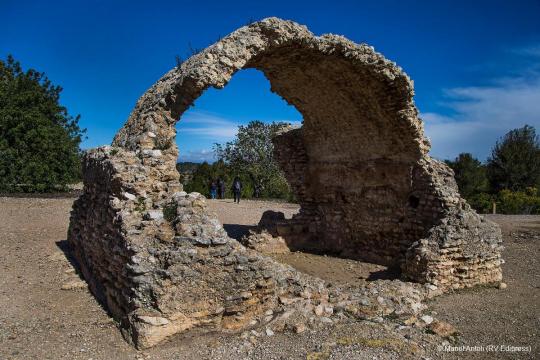
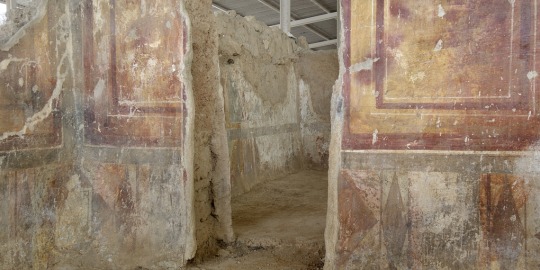


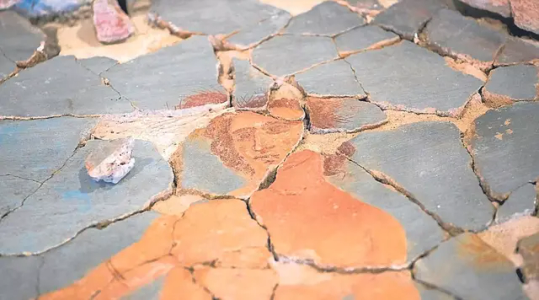
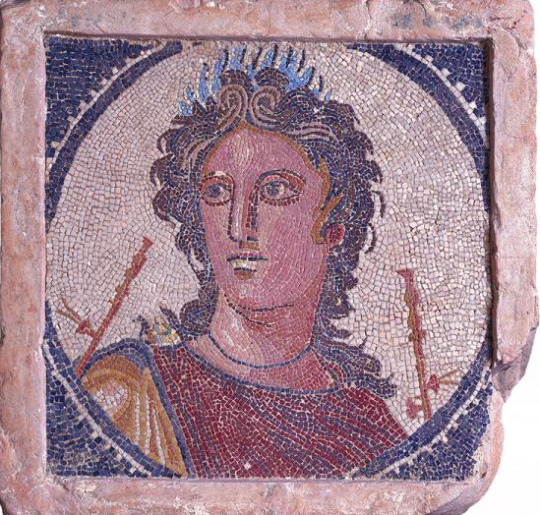


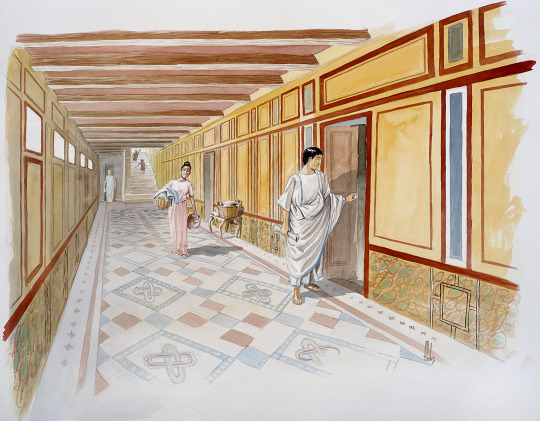
Vil·la romana dels Munts (Els Munts Roman Villa) is one of the best preserved Roman villas in the Iberian peninsula, the Roman province of Hispania. It's located in modern-day Altafulla (Camp de Tarragona, Catalonia), in the countryside near the important Roman city of Tarraco (modern-day Tarragona). The villa's archaeological remains are included in the UNESCO World Heritage Site "Archaeological Ensemble of Tarraco".
The oldest part of the villa dates from the 1st century AD, when it was a small farming villa, but it was soon abandoned. In the early 2nd century AD, the old villa was demolished and the place was rebuilt as a large, aristocratic villa: it still kept having a significant agricultural role, but included a magnificent and luxurious residence area. To get an idea of how luxurious it was, a normal 2nd-century Roman villa might have one marble covering, while Els Munts has hundreds of coverings made of marble imported from the Eastern Mediterranean and the North of Africa. The residence also had wall paintings, mosaic floors, statues, fountains, and artificial ponds. The villa also included a bath house and a the largest temple of the Mithraic religion known in the Western Roman Empire.
When the Roman emperor Hadrian stayed in Tarraco the winter of 122-123 AD, it's thought that this villa could have been the place where he was staying. A statue of Antinous (Hadrian's lover) was found in Els Munts.
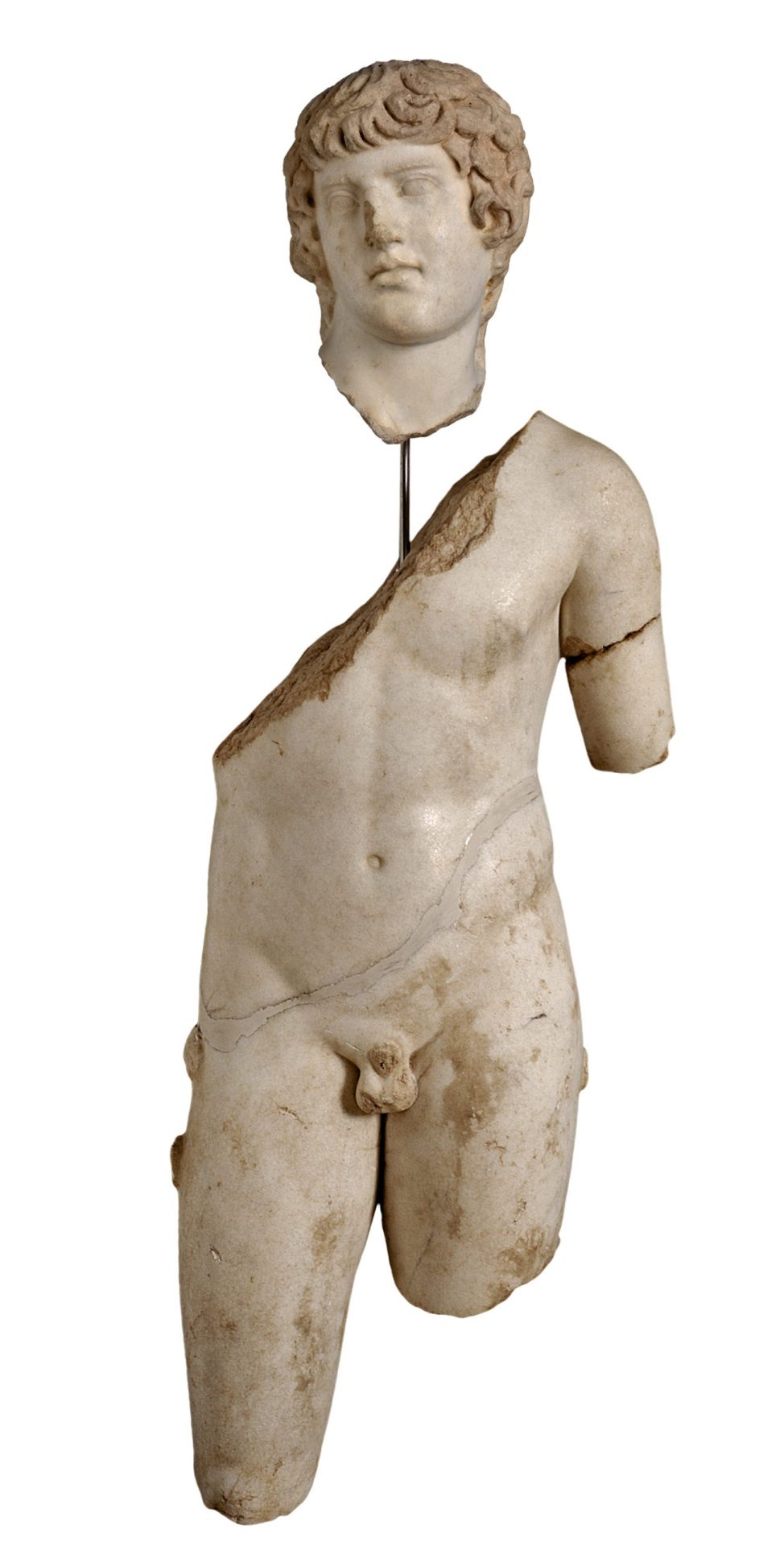
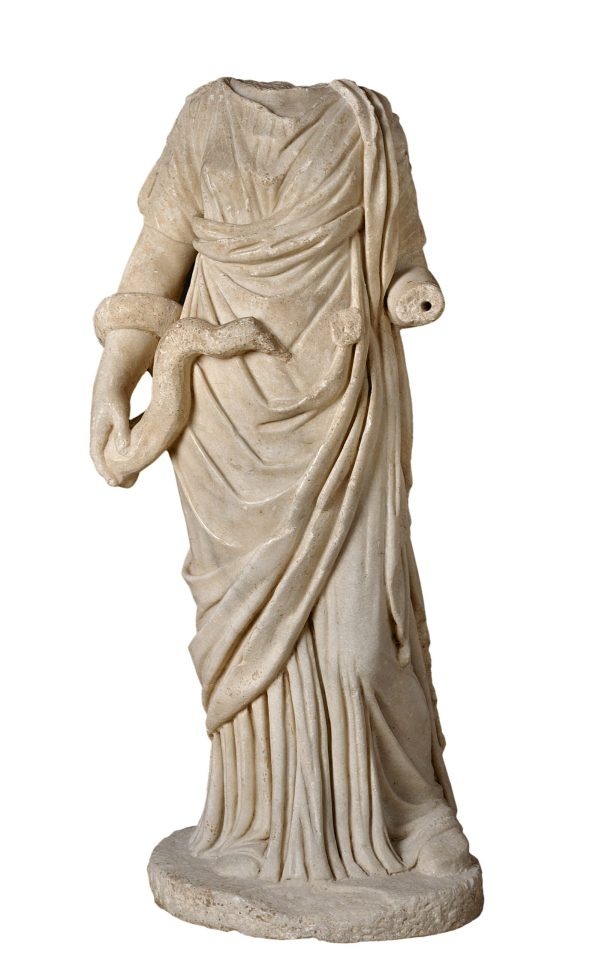

Statue of Antinous, Higea, and Asclepios found in Els Munts. Nowadays in Museu Nacional Arqueològic de Tarragona.
The villa was partially destroyed by a fire in the late 3rd century, starting its decline. In the early 5th century, it was remodelled into a Late Roman villa and then a Visigothic one, and was in use until the 7th century.
Photos by Quim Roser/Dep. Cultura, ArqueoXarxa, Manel Antolí/Tarragona Turisme, Tjerk van der Meulen/Ara, MNAT - Google Arts and Culture. Drawing reconstruction by Hugo Prades/MNAT. Information from Museu Nacional Arqueològic de Tarragona and Ara (Josep Anton Remolà).
#vil·la romana dels munts#arqueologia#història#altafulla#catalunya#arts#archaeology#archeology#ancient rome#ancient roman#antinous#emperor hadrian#ancient#antiquity#roman empire#mosaic#catalonia#europe#travel#travel photography
119 notes
·
View notes
Text
something i found out about this morning that i thought was kinda interesting, regarding alhaitham’s constellation being vultur volans and kaveh’s ascension regional specialty being the mourning flower
so obviously the main inspiration behind the mourning flower is the kaiser’s crown aka fritillaria imperialis, bearing a striking resemblance both in its appearance and its meaning in iranian culture.
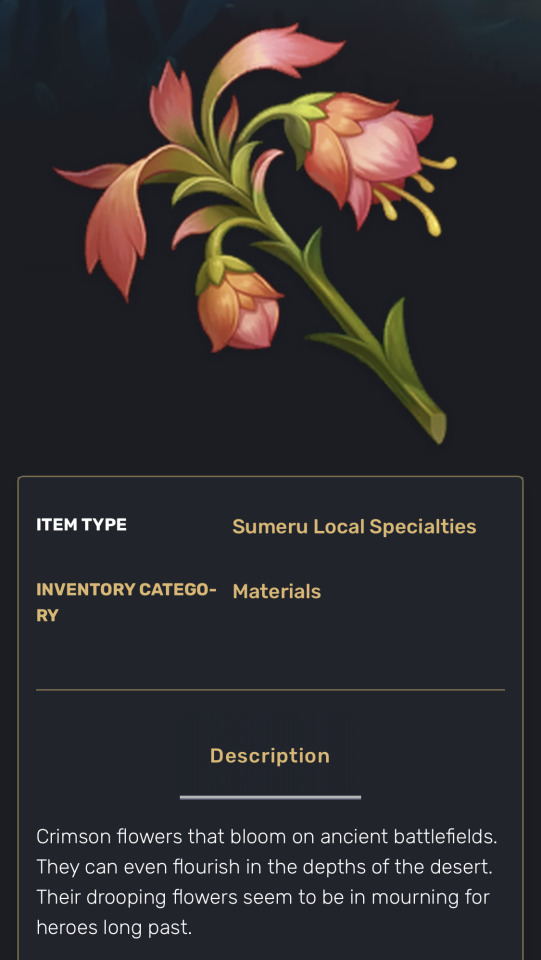
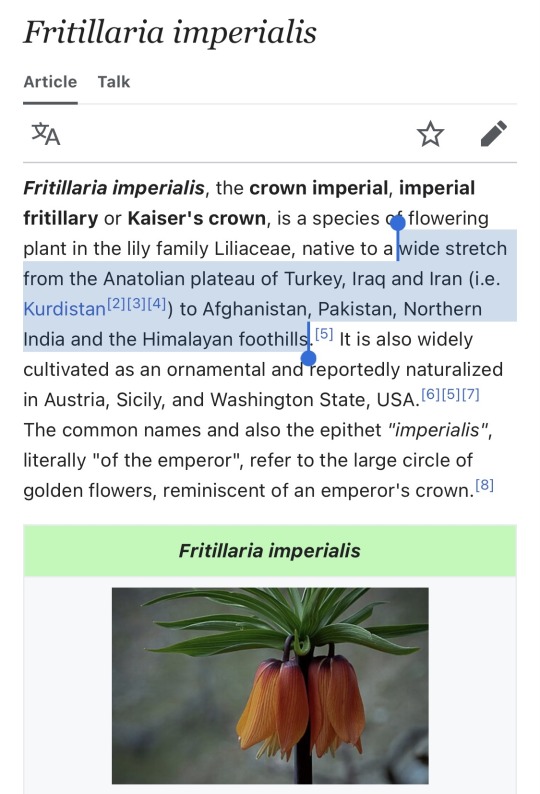

i want to put a pin in that. we know that vultur volans is the roman empire’s name for aquila, and that aquila is made up of both the eagle and antinous. (side note: antinous became a symbol of male homosexuality, so this can also go on the extensive list of kaveh and alhaitham’s queercoding in canon)
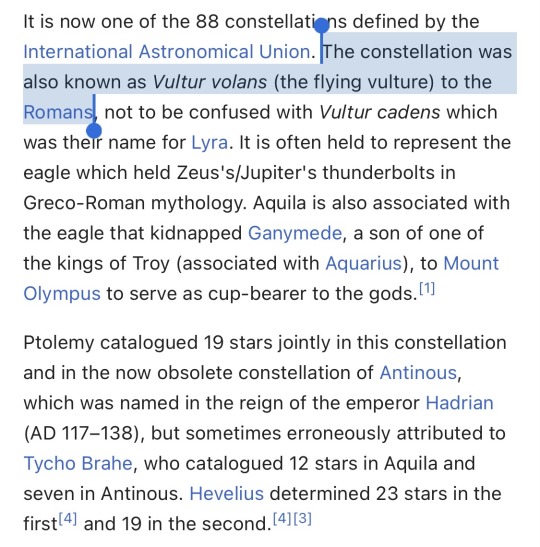
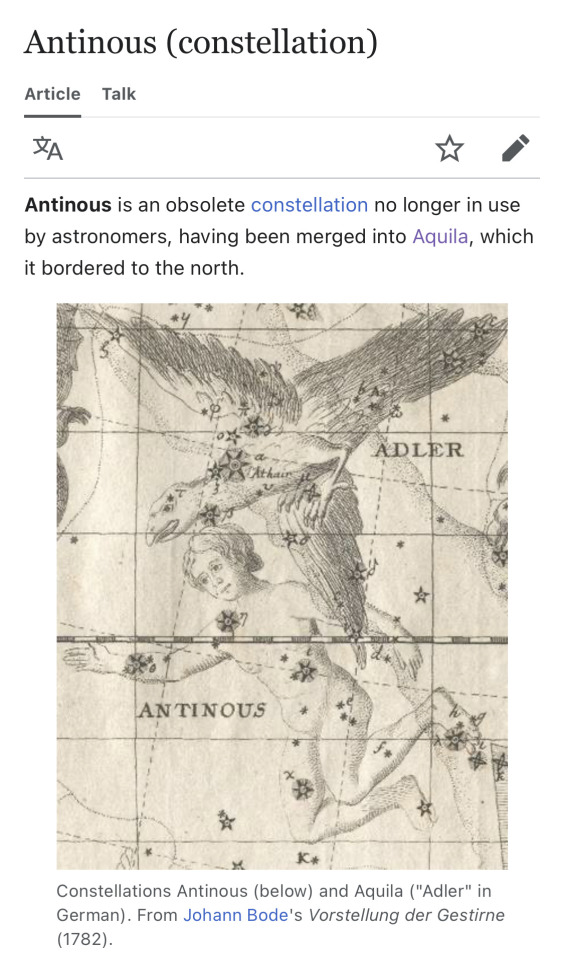
i was reading about the deification of antinous after his accidental death which was possibly a drowning, and also came across a quote from kaveh’s hangout, which i thought was really interesting in light of alhaitham’s constellation’s connection with antinous.

that’s kind of besides the point but i thought it was interesting regardless—this theme of losing a lover to drowning, whether that be physical or metaphorical. anyways what i also found to be super interesting was the other main thing emperor hadrian named after antinous—a rosy lotus.

now i’m totally willing to accept the kaiser’s crown as the only inspiration behind the mourning flower, but i *do* find it interesting that the kaiser’s crown’s main habitat is foothills/mountainous areas, whereas the mourning flower pretty much exclusively appears on the banks of rivers/bodies of water in the girdle of the sands region, which sounds a lot more like the habitat of the flower of antinous.
i would think i’m reaching if it wasn’t for the fact that genshin can (and does) get this detailed, even with the whole plato and socrates school of athens painting parallel that kaveh and alhaitham *also* have going on.
so yeah, this connection of alhaitham to antinous and antinous to this flower kinda lead me to believe that this was another aspect of the design/meaning of the mourning flower, especially its reason for being the material used to ascend kaveh. what do you guys think??
#i know i’ve never posted lore analysis but this rly got me thinking. much to think about.#kavetham#haikaveh#alhaitham#kaveh#genshin impact#genshin meta#soapbox#image
268 notes
·
View notes
Text
Antinous, the beautiful young man who gave his life for love to emperor

Antinous was favorite and lover of emperor Hadrian.
"Antinous died in Egypt after falling into the Nile, according to what Hadrian wrote or, according to what really happened, because he was offered as a sacrifice. Hadrian was a great enthusiast of all kinds of divinations and enchantments. Thus, Hadrian honored Antinous - because of his love for him or because he would have agreed to die freely - since the voluntary surrender of a life was necessary for to achieve what he intended." -Dio Cassius
"The reason for this would have been that Hadrian wanted to prolong his life and that upon asking a magician to take his place, everyone backed off but Antinous offered to do so." -Aurelius Victor
Emperor Hadrian (reign: 117-138)
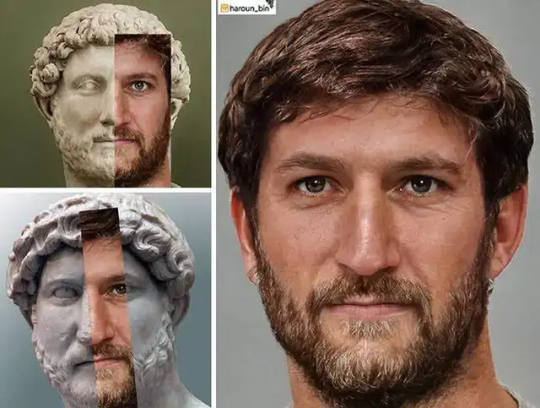
Born on January 24, 76, he was the nephew of his predecessor, Trajan. He was married to Vibia Sabina, grandniece of Trajan, with whom he had a terrible relationship but curiously he loved his mother-in-law, Salonia Matidia (Trajan's niece) like a mother.
He is the third of the so-called "Five Good Emperors", however Hadrian was the only one of the five who was not popular either among the people or in the Senate, because:
He was the one who stopped - forever - the expansion of the Empire. This was not welcomed at that time because territorial expansion was the soul of Rome since its founding.
He was the first to wear a beard, something that the Romans associated with barbarism and "weird people", only some gods would look good with a beard. Later this Hadrian novelty became fashionable in Rome.
He used to have sudden attacks of anger becoming aggressive, and hours later he would lament bitterly and try to repair any damage done. This "bipolarity" was seen as a non-Roman attitude.
No one before or after him toured the entire empire as Hadrian did, which is why he is known as 'The Traveling Emperor'. His endless tours were not well regarded by the Senate.
His relationship with Antinous, considered inappropriate because he was not a slave and Hadrian had him in public concubinage
But despite everything, he was a good emperor; That's why he ruled without problem for 21 years
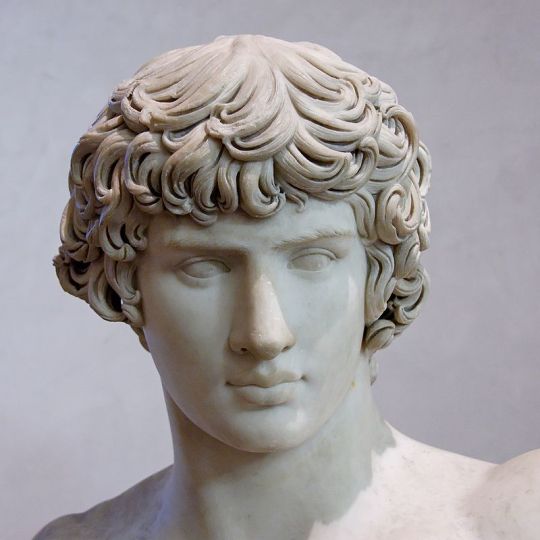
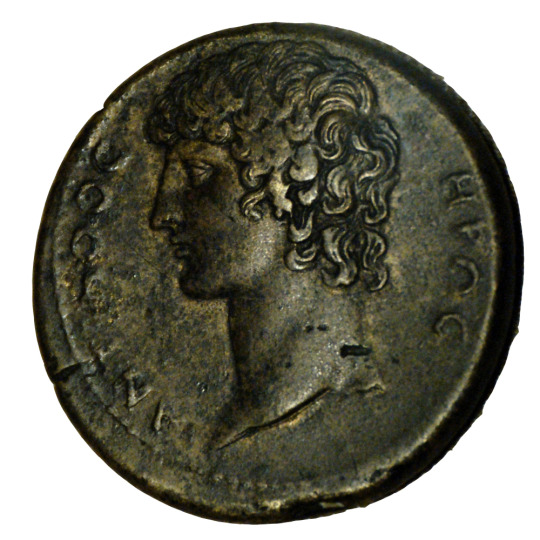
Unfortunately there are no historical sources about the life of Antinous but, thanks to his sculptures, it is known that he was a very handsome young man. As a teenager - but let us remember that the notion of adolescence did not exist in the ancient world - he met Hadrian in Bithynia. From that moment until the day of his death, when he was around 20 years old, he did not separate from Hadrian.
What really happened on the Nile
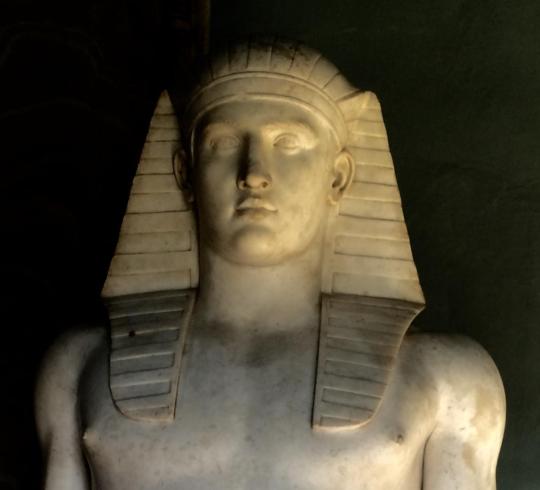
Antinous as Osiris- Vatican Museums.
After listening to a lecture and reading, I discovered that shortly before the death of Antinous, the emperor began to feel ill to the point that he feared an imminent death. But as was his custom, instead of looking for medicine, he looked for magic spells in the East.
When he arrived in Egypt with Antinous on October 24, 130, the arrival coincided-and was not so coincidental-with the beginning of the religious ceremony commemorating the death of Osiris, drowned in the Nile and then resurrected by his wife Isis. During the days of the commemoration, death and resurrection of Osiris, Isis was invoked in healing incantations.
Cassius Dio's suspicions are the same as other Roman historians as well as modern ones, because the death of Antinous was coincidentally during that religious ritual.
But those same historians agree that it was not Hadrian who asked Antinous to sacrifice himself. As the Roman historian Aurelius Victor wrote, he asked a magician for the sacrifice, but that man and the others backed away, so Antinous voluntarily decided to enter the Nile.
After the death of Antinous, Hadrian founded in Egypt the city Antinoöpolis in his honor. According to Dio Cassius, this was the reason for the sacrifice: "Since the voluntary surrender of a life was necessary for to achieve what he (Hadrian) intended, to found that city."
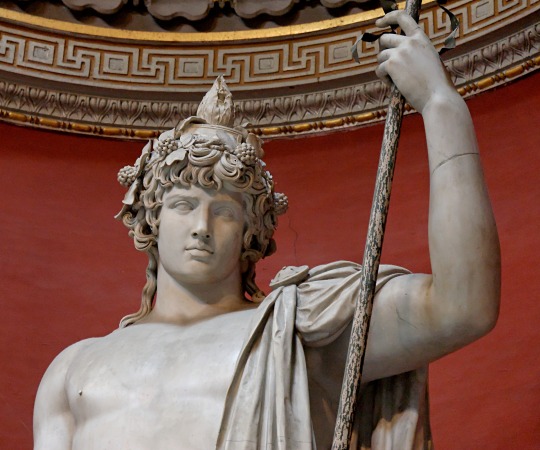
Cassius Dion's statement confuses me and seems very strange to me. Why would an emperor need the voluntary sacrifice of a life in order to found a city?
It is very likely that Antinous really believed in those practices, that is, he believed that by doing that, his emperor could heal and live longer. Hadrian deified him, and I think Hadrian founded the city Antinoöpolis in Egypt because his beloved Antinous died there.
88 notes
·
View notes